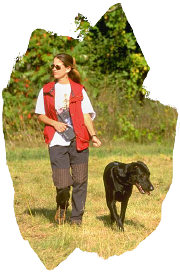Avoid “humanizing” your dog (known as “anthropomorphism,” which means giving human qualities to animals)! Your dog is not a human child wearing a furry suit. He’s a dog, and behaves like a dog. He doesn’t do things out of spite, he doesn’t get jealous, and he doesn’t choose not to listen to you. Dogs do only behaviors that for them. If he’s learned that a particular behavior (i.e.,jumping up on people, nipping and biting) gets him reinforced in some way, he’ll continue to do that behavior until he’s taught that a more appropriate, alternative behavior will become more rewarding than the one he’s been doing all along.
Here are some facts for you to consider:
- Physical punishment is inhumane, and it doesn’t work anyway!
Yes, he might stop doing whatever you punished him for in order to stop the punishment; but he won’t trust you when you show aggression toward him. Punishment can suppress a behavior, but all too often, it can come back in some other form (biting!). - Your dog never feels guilty about anything!
When your dog stands in front of you with that look of “guilt,” he is merely responding to your negative, angry demeanor and is trying to calm you down so you’ll go back to being the “you” he feels safe with. You say things like, “what did you do?” and he looks away, he lowers his head and his tail goes between his legs. Sometimes he runs away and hides in order to avoid punishment. Dogs view things as either safe or dangerous. When you’re screaming at him, all he wants to do is get things back to normal as quickly as possible. If your dog continues to “misbehave” over and over again, surely he’s not intentionally trying to bring your wrath down on him. He just needs to be taught a more appropriate behavior. - Teach your children to behave properly with your dog.
Never allow children to pull tails or ears, or to sit on your dog. Many puppies and adult dogs do not like when children get in their face. Dogs can nip or bite children who continually hug them or try to kiss them. Always supervise children and dogs when they’re together, and never leave them alone together without an adult to supervise!
- Always praise and reward your dog when he’s behaving well.
We tend to punish dogs for doing what we don’t want them to do, but we neglect to acknowledge and reward them for doing something that is good. Give your dog that feedback whenever he’s doing something that you like. Otherwise, his good behavior will fade. - Avoid using choke chain collars and shock collars.
Choke collars can cause injuries to a dog’s trachea. They can also cause ocular hemorrhages. Shock collars do cause pain and using pain to train a dog is always inappropriate! - Never chain a dog outside and leave him unsupervised!
Chained or tied up dogs become frustrated and angry because they are prevented from being where the activity is. Dogs are pack animals and enjoy being a part of what’s going on. Each time your dog runs toward the end of his chain, he gets a major leash correction. This creates anger and barrier frustration. If you don’t have a fence, bring your dog inside the house, or put him in an outside kennel where he has room to walk around. Also provide him with a doghouse or other shelter so he can escape from the elements. - Avoid free-feeding your dog.
Do not leave food in his bowl all day. He will become a fussy eater, and you won’t be able to establish a routine of good housetraining, because his digestive system will not become regulated. Your dog will not value his food, and will just nibble at it like a cat. Dogs in the wild have to hunt for their meals. They are not grazers! - Provide plenty of opportunity for your dog to receive daily exercise. Most of all behavior problems can be elminated or improved when a dog is able to release pent-up energies. A tired dog is a good dog!
©2009 Renee Premaza
